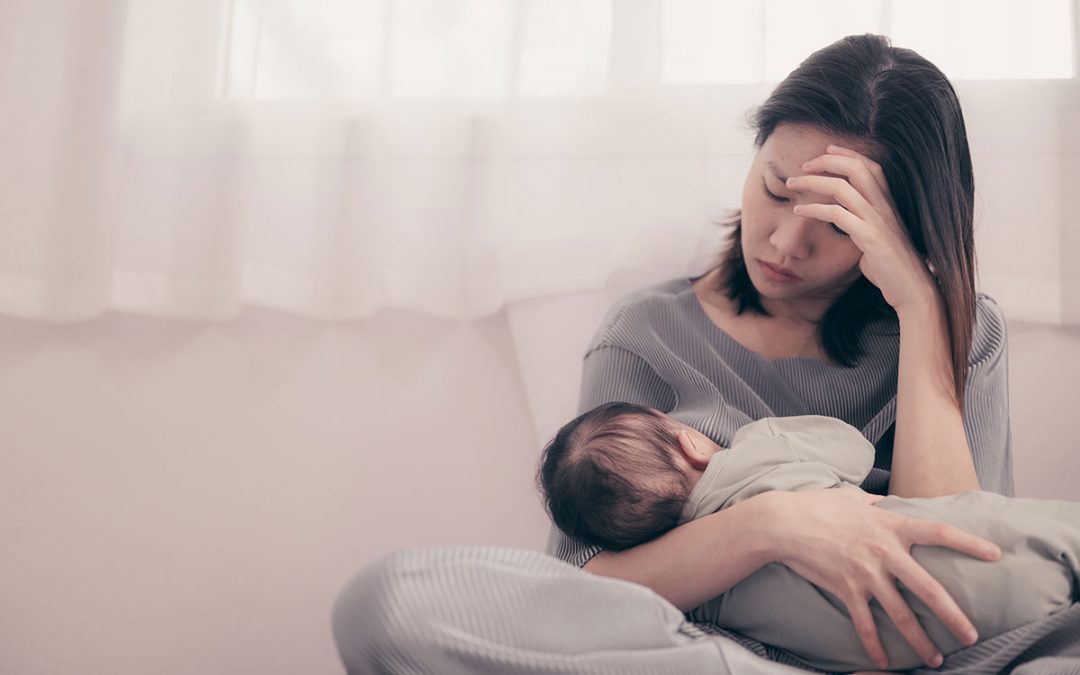The postpartum period — the days, weeks, and months after childbirth — is often a time of great joy and celebration. But it can also be a time of distress and anxiety, and it’s common for new mothers to experience mental health problems known as Postpartum Disorders (PPD).
Symptoms of these disorders range from mild to severe and include postpartum anxiety, mood swings, depression, and suicidal thoughts. While temporary, these symptoms can last for months or years and, if left untreated, may result in serious consequences.
In this article, we’ll review the different types of postpartum disorders, available treatment options at both inpatient and outpatient facilities, and how patients can stay safe during treatment.
What Does the Term “Baby Blues” Mean?
“Baby blues” is the term for the normal feelings of sadness, anxiety, and irritability that many women experience shortly after giving birth. Hormonal changes yield powerful emotions that occur after delivery and contribute to the baby blues, which typically begin in the first 2-3 days postpartum — and can last up to two weeks, or longer.
Symptoms may include:
- Mood swings
- Crying more than usual
- Difficulty sleeping
- Sadness
- Reduced concentration
- Feeling overwhelmed
These brief emotional ups and downs are normal and usually go away on their own. However, worsening symptoms or thoughts of self-harm or harming the baby indicate a more serious postpartum disorder and requires prompt treatment.
Types of Postpartum Disorders
Postpartum Depression (PPD)
Unlike baby blues, PPD is a type of major depression that requires treatment to resolve. Like clinical depression, postpartum depression is characterized by feelings of intense sadness, guilt, or worthlessness.
Other symptoms commonly experienced with PPD include:
- Fatigue
- Loss of interest in activities once enjoyed
- Changes in appetite or sleep patterns
- Thoughts of suicide or death
Postpartum Post-Traumatic Stress Disorder (PTSD)
Postpartum post-traumatic stress disorder (PTSD) develops after experiencing a traumatic event during pregnancy or childbirth. Women in their postpartum period may suffer from PTSD alone or comorbidly with PPD.
Common symptoms of postpartum PTSD include:
- Flashbacks
- Nightmares
- Intrusive thoughts about the event
- Anxiety
- Panic attacks
- Hypervigilance (feeling constantly on alert)
Postpartum Psychosis
Postpartum psychosis is a rare but serious condition that affects approximately 1 in 500 postpartum women. It is more severe than other postpartum disorders and is often associated with delusions and hallucinations that can make it difficult for a mother to care for herself or her infant.
Other symptoms include:
- Manic episodes, depressive episodes, or a rapid switch between both
- Disorientation
- Lack of inhibitions
- Fear and paranoia
- Restlessness
- Severe insomnia
- Agitation
- Feelings of violence toward or detachment from the new baby
The onset of postpartum psychosis typically occurs within the first two or three weeks after delivery and can quickly become dangerous if left untreated.

What Causes Mental Illness After Giving Birth?
A variety of physical and emotional factors may contribute to an individual’s risk for postpartum psychiatric disorders. Hormonal fluctuations, sleep deprivation, and the upheaval that families experience with newborn care can all play a role in a new mother’s mental state.
However, women are at higher risk for postpartum disorders if they:
- Have an existing diagnosis or family history of depression, bipolar disorder, schizophrenia, or psychotic episodes
- Experienced postpartum depression or psychosis following a previous pregnancy
- Discontinued mood stabilizers or antipsychotic medications during pregnancy
- Give birth to multiples
- Have difficulty breastfeeding
- Lack healthy support systems
- Experienced complications during pregnancy
RELATED: Mental Health Services: Inpatient vs. Outpatient Treatment
Postpartum Treatment for Maternal Mental Health
It’s important to note that most women who experience postpartum depression, PTSD, psychosis, and other mental illnesses associated with childbirth can fully recover with the right treatment.
Most often, treatment starts with medication, finding a solid support system, and seeking additional support from qualified mental health professionals. For more severe postpartum disorders, and especially for those suffering from postpartum psychosis, hospitalization in an inpatient facility may be recommended to ensure the optimal safety of the patient and their child.
Postpartum inpatient care is designed to help mothers rest, fully recover, and return safely to their families. And while treatments can include mood stabilizing or antipsychotic medications, psychological therapy, and electroconvulsive shock therapy (ECT), many facilities offer additional resources such as lactation and nutritional consultants, spiritual support, and more.

Postpartum psychiatric disorders are largely common, temporary, and treatable.
However, for patients experiencing severe postpartum psychiatric symptoms, close monitoring is essential to reducing risk related to self-harm or other acts of violence.
With ObservSMART, behavioral health staff can provide a higher level of care for postpartum mothers suffering from life-threatening psychiatric disorders in inpatient facilities. Our continuous monitoring system improves overall care quality and increased staff accountability with 100% validated patient checks, multiple unit monitoring and notifications, and customizable alerts that ensure prompt assistance when problems arise.
ObservSMART’s compliance technology reduces risk for mothers experiencing dangerous postpartum psychiatric disorders. Contact us for more information or to request a demo for your healthcare facility.

